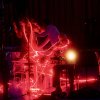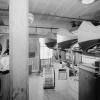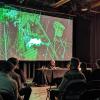
By Silicon Valley standards, the men who invented the modular synthesizer were naifs who left piles of money on the table. But Don Buchla and Robert Moog were far less interested in monetizing the disruption of the music business than in opening up vast new sonic frontiers for experimental-minded musicians.
Working independently in the early 1960s, both men devised analog synthesizers with ring modulators, voltage-controlled oscillators, filters, envelope generators, and mixers that allowed musicians to create sounds never heard before. While the New York-based Moog became a household name when he introduced, in 1964, a commercial version of his eponymous instrument with a keyboard interface (effectively deployed by composer Wendy Carlos on the hit 1968 album Switched-On Bach), the Berkeley-based Buchla remained a cult figure, due to both the expense of his instruments and his use of non-keyboard interfaces.
But before his death in 2016 at the age of 79, Buchla was getting a second look as artists started investigating analog synths again and companies began producing much less expensive versions of his instruments (using technology he invented but didn’t patent).
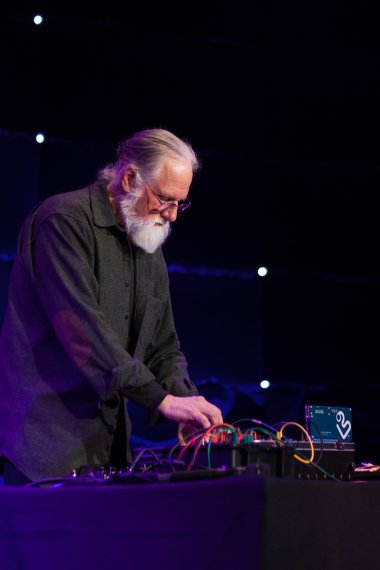
The expansive, multifarious terrain unlocked by Buchla’s creations was on full display at a San Francisco memorial celebration of his life and work in 2017. The packed two-day event brought together composers and musicians from around the world, including Morton Subotnick, David Rosenboom, Richard Devine, Maggi Payne, Laetitia Sonami, Marielle V. Jakobsons, Bob Ostertag, Laurie Spiegel, George Lewis, Thomas Dimuzio, Stephen Ruppenthal, and Todd Barton.
Now, Barton and Rupperthal are kicking off what might be the largest gathering of the far-flung Buchla tribe since. The two are slated to make music on Thursday, May 15, at Wyldflowr Arts, a cozy West Oakland performance space that’s quickly become one of the Bay Area’s liveliest cultural outposts. Curated by Philip Gelb, who made his mark in new music on the traditional Japanese shakuhachi (end-blown flute), the three-day Buchla Electronic Music Festival, which runs through Saturday, May 17, is being presented by RootStock Arts.
Gelb launched the current Buchla appreciation with a one-day RootStock event at Wyldflowr last year, and the feeling was “we should do more of this,” said Barton, who was there and is again traveling from his home in Ashland, Oregon, for this month’s festival. Something of a Buchla guru who has created hundreds of videos demystifying many of the inventor’s instruments, Barton opens the festival with a set of Buchla Music Easel duets with Ruppenthal, who also plays a Buchla 200 system. The evening also features Silvia A. Matheus soloing on a Buchla Tiptop system and computer.
Barton started his musical journey in the mid-1970s as an early-music acolyte and was turned on to the world of Buchla by a friend who’d worked widely installing Buchla systems at various institutions. “I’d followed electronic music on vinyl but never touched an electronic instrument,” Barton recalled. “It just blew my mind that I could make timbres and sounds I’d never heard before.”
He wanted to dive in, but at the time Buchla ran a boutique company that made only two dozen or so instruments a year. The running cost of one was about $10,000, twice the average cost of a new car.
Catching wind of Serge Tcherepnin’s work on what that inventor had dubbed the People’s Synthesizer, Barton contacted Tcherepnin at his Haight-Ashbury worship and ordered a far less expensive analog rig. When the rise of digital synthesizers in the 1980s led to a glut of abandoned instruments, Barton “thought there was more territory to explore in analog,” he said. “Everyone gave me their analog gear. I had this amazing collection.”
It wasn’t until Barton retired in 2012 after a four-decade tenure as resident composer for the Oregon Shakespeare Festival that he finally had time to immerse himself in his Buchlas. He started making videos for his own archives to document his experiments and gradually realized these might be useful to other artists exploring the unwelcoming instruments.
“There’s no real manual for the Buchla,” Barton said. “That was by design. I started posting these low-res videos, people started responding, and there was dialogue. I finally got a better camera and audio, though I’m still pretty much shooting from the hip.”
After Barton and Ruppenthal get things going, the RootStock festival continues Friday, May 16, with a solo set by Steve McQuarry playing Music Easel and a Tiptop system. A noted jazz composer, arranger, and orchestrator, McQuarry has turned his attention to electronic music in recent years.
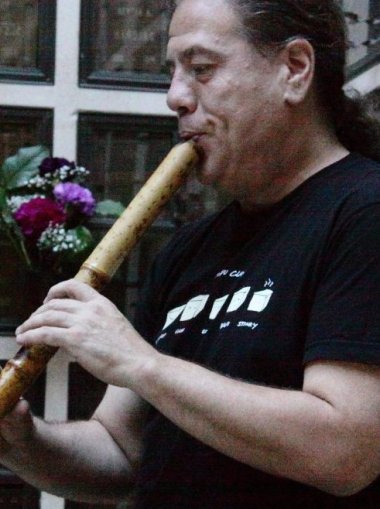
Friday’s double bill also features an improvised electroacoustic set by the Kra Pow 5, with Gelb on Music Easel, Thomas Dimuzio on a Buchla 200e system, Kyle Bruckmann on oboe and English horn, Fred Lonberg-Holm on cello, and Kanoko Nishi on koto (Japanese half-tube zither). The festival closes on Saturday with a solo set by Dimuzio and a duo set by Barton and Bruce Bayard on Music Easels.
In many ways, spearheading the Buchla Festival marks a musical renaissance for Gelb, who was forced to set aside the shakuhachi due to dental problems. For the past decade he’s focused on his practice as a vegan chef, including an intimate dinner-and-concert series run out of his West Oakland space and featuring an array of illustrious musicians. It was only when Barton, a former shakuhachi student of Gelb’s, gave him a Buchla Easel that he started making music again.
Taking up Buchla instruments completes a circle that started for Gelb in 1996 at his first Bay Area performance, a duet with electronic musician Chris Brown. Buchla came to the concert “and approached me afterward about synthesizing shakuhachi sounds,” Gelb said. While they never ended up collaborating on that project, their paths crossed frequently over the years as Gelb worked with many electronic musicians, including Brown, Tim Perkis, and Miguel Frasconi. Composer Pauline Oliveros, Gelb’s mentor, was another point of connection; she was an early member of the San Francisco Tape Music Center, the experimental collective that commissioned the creation of Buchla’s first modular electronic music system.
In the same way that Barton’s leap from early music to synthesizers was linked by his love of “all these bizarre timbres” on Renaissance and Baroque wind instruments, Gelb sees a good deal of continuity in his embrace of the Bucha Easel, “which has a lot in common with shakuhachi, as they’re very much about color and timbre,” he said.
But “the Buchla doesn’t come with hundreds of years of history and religion and culture,” as Gelb put it, so anything is still possible.


